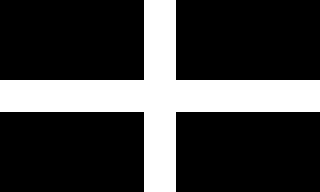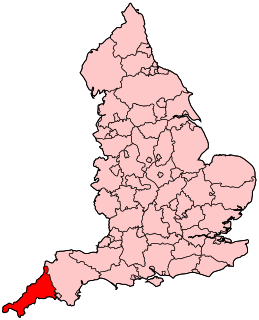Related Research Articles

Cornwall is a historic county and ceremonial county in South West England. It is recognised as one of the Celtic nations, and is the homeland of the Cornish people. Cornwall is bordered to the north and west by the Atlantic Ocean, to the south by the English Channel, and to the east by the county of Devon, with the River Tamar forming the border between them. Cornwall forms the westernmost part of the South West Peninsula of the island of Great Britain. The southwesternmost point is Land's End and the southernmost Lizard Point. Cornwall has a population of 568,210 and an area of 3,563 km2 (1,376 sq mi). The county has been administered since 2009 by the unitary authority, Cornwall Council. The ceremonial county of Cornwall also includes the Isles of Scilly, which are administered separately. The administrative centre of Cornwall is Truro, its only city.

Truro is a cathedral city and civil parish in Cornwall, England. It is Cornwall's county town, sole city and centre for administration, leisure and retail trading. Its population was 18,766 in the 2011 census. People of Truro can be called Truronians. It grew as a trade centre through its port and as a stannary town for tin mining. It became mainland Britain's southernmost city in 1876, with the founding of the Diocese of Truro. Sights include the Royal Cornwall Museum, Truro Cathedral, the Hall for Cornwall and Cornwall's Courts of Justice.

Michael Joseph, better known as Michael An Gof, was one of the leaders of the Cornish rebellion of 1497, along with Thomas Flamank.

Bhat is a surname in the Indian subcontinent. Bhat and Bhatt are shortened rendition of Bhatta.

St Columb Major is a town and civil parish in Cornwall, England, United Kingdom. Often referred to locally as St Columb, it is approximately seven miles (11 km) southwest of Wadebridge and six miles (10 km) east of Newquay The designation Major distinguishes it from the nearby settlement and parish of St Columb Minor on the coast. An electoral ward simply named St Columb exists with a population at the 2011 census of 5,050. The town is named after the 6th-century AD Saint Columba of Cornwall, also known as Columb.

Sport in Cornwall includes two sports not found elsewhere in the world, except in areas influenced by Cornish culture i.e. the Cornish forms of wrestling and hurling. The sports otherwise most closely associated with Cornwall are rugby union football and surfing.

The Cornish people or Cornish are an ethnic group native to, or associated with Cornwall and a recognised national minority in the United Kingdom, which can trace its roots to the ancient Britons who inhabited southern and central Great Britain before the Roman conquest. Many in Cornwall today continue to assert a distinct identity separate from or in addition to English or British identities. Cornish identity has been adopted by migrants into Cornwall, as well as by emigrant and descendant communities from Cornwall, the latter sometimes referred to as the Cornish diaspora. Although not included as an explicit option in the UK census, the numbers of those claiming Cornish ethnic and national identity are officially recognised and recorded.
Jenkin, of Franconian origin, is translated in English as "Little John" or more literally "John the little".

The Cornish diaspora consists of Cornish people and their descendants who emigrated from Cornwall, United Kingdom. The diaspora is found within the United Kingdom, and in countries such as the United States, Canada, Australia, Argentina, New Zealand, Mexico, Panama, South Africa, the Samoas and Brazil.
Paynter is a surname. It can either be of British origin, meaning "the head/end of the land" in the Cornish language, or it can be of English-language origin, where it is occupational and refers to a painter. It may refer to:

Trevallyn is a residential locality in the local government areas (LGAs) of Launceston (25%) and West Tamar (75%) in the Launceston LGA region of Tasmania. The locality is about 3 kilometres (1.9 mi) west of the town of Launceston. The 2016 census recorded a population of 4562 for the state suburb of Trevallyn. It is a suburb of Launceston.
Pascoe is a Cornish given name and surname which means "Easter children" from the Cornish language Pask, cognate of Latin Pascha ("Easter"). Pascoe is a Cornish pet form of name Pascal, introduced by the Norman knights into England after the Conquest started in 1066, and derives from the Latin paschalis, which means "relating to Easter" from Latin Pascha ("Easter"). Alternative spellings are Pasco, Pascow and Pascho. Pascoe is the most common Cornish name.
Penberthy is a locational surname of Cornish origin, which meant a person from Penberthy Cross in Cornwall. Notable people with the surname include:
Angove River or Angove Creek is a river located in the Great Southern region of Western Australia most of the river is found within Two Peoples Bay Nature Reserve.

Cornish Australians are citizens of Australia who are fully or partially of Cornish heritage or descent, an ethnic group native to Cornwall in the United Kingdom.
Cornish surnames are surnames used by Cornish people and often derived from the Cornish language such as Jago, Trelawney or Enys. Others have strong roots in the region and many in the UK with names such as Eddy, Stark or Rowe are likely to have Cornish origins. Such surnames for the common people emerged in the Middle Ages, although the nobility probably had surnames much earlier on. Not until the later Middle Ages did it become necessary for a common man to have a surname. Most surnames were fully established throughout Cornwall by the end of the 15th century. Today Cornish surnames can be found throughout the world as part of the Cornish diaspora.
Hosking is a surname of Cornish origin. In Cornwall there are also the variant forms Hosken, Hoskin and Hoskins. Unlike many Cornish surnames which are associated with a small district, Hosking and its variants are distributed in west Cornwall, mid Cornwall (Hoskins) and east Cornwall (Hoskin). It has the meaning "sedgeman", i.e. a thatcher who makes roofs of sedge.
The Cornish dialect is a dialect of English spoken in Cornwall by Cornish people. Dialectal English spoken in Cornwall is to some extent influenced by Cornish grammar, and often includes words derived from the Cornish language. The Cornish language is a Celtic language of the Brythonic branch, as are the Welsh and Breton languages. In addition to the distinctive words and grammar, there are a variety of accents found within Cornwall from the north coast to that of the south coast and from east to west Cornwall. Typically, the accent is more divergent from Standard British English the further west through Cornwall one travels. The speech of the various parishes being to some extent different from the others was described by John T. Tregellas and Thomas Quiller Couch towards the end of the 19th century. Tregellas wrote of the differences as he understood them and Couch suggested the parliamentary constituency boundary between the East and West constituencies, from Crantock to Veryan, as roughly the border between eastern and western dialects. To this day, the towns of Bodmin and Lostwithiel as well as Bodmin Moor are considered the boundary.

The following outline is provided as an overview of and topical guide to Cornwall: Cornwall – ceremonial county and unitary authority area of England within the United Kingdom. Cornwall is a peninsula bordered to the north and west by the Celtic Sea, to the south by the English Channel, and to the east by the county of Devon, over the River Tamar. Cornwall is also a royal duchy of the United Kingdom. It has an estimated population of half a million and it has its own distinctive history and culture.
Presented below is an alphabetical index of articles related to Cornwall: